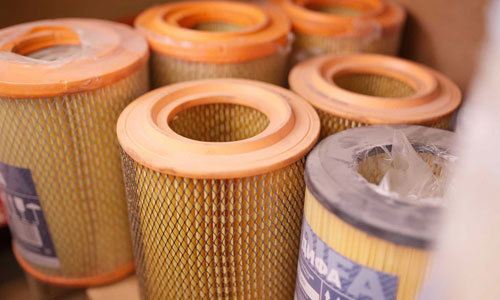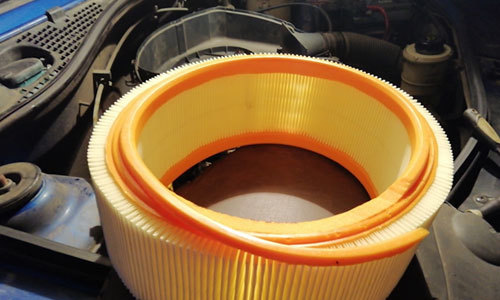The Benefits of Using Cylindrical Air Filters for Optimal Machinery Performance
2025-07-19
The Benefits of Using Cylindrical Air Filters for Optimal Machinery Performance
Table of Contents
1. Introduction to Cylindrical Air Filters
2. Key Benefits of Cylindrical Air Filters
2.1 Enhanced Efficiency
2.2 Increased Equipment Longevity
2.3 Cost-Effectiveness
2.4 Optimal Performance
3. Types of Cylindrical Air Filters
3.1 Pleated Air Filters
The Benefits of Using Cylindrical Air Filters for Optimal Machinery Performance
Table of Contents
- 1. Introduction to Cylindrical Air Filters
- 2. Key Benefits of Cylindrical Air Filters
- 2.1 Enhanced Efficiency
- 2.2 Increased Equipment Longevity
- 2.3 Cost-Effectiveness
- 2.4 Optimal Performance
- 3. Types of Cylindrical Air Filters
- 4. How to Select the Right Cylindrical Air Filter
- 5. Maintenance Tips for Cylindrical Air Filters
- 6. Conclusion
- 7. Frequently Asked Questions
1. Introduction to Cylindrical Air Filters
Cylindrical air filters play a pivotal role in ensuring optimal performance and efficiency in various machinery. Their unique shape allows for a maximized surface area, enabling enhanced airflow and filtration capabilities. In environments where particulate matter, dust, and contaminants abound, the effective use of cylindrical air filters can significantly improve the lifespan and functionality of machines.
2. Key Benefits of Cylindrical Air Filters
Understanding the specific advantages of cylindrical air filters can empower machinery operators and maintenance teams to make informed decisions. Here, we delve into the core benefits of these air filters.
2.1 Enhanced Efficiency
Cylindrical air filters offer superior efficiency in trapping airborne pollutants. Due to their design, they facilitate increased airflow, reducing the load on machinery. This enhanced airflow is crucial, as it decreases the energy consumption of equipment, leading to more sustainable operations.
2.2 Increased Equipment Longevity
The lifespan of machinery is directly correlated with the cleanliness of the air it processes. By using cylindrical air filters, operators can minimize wear and tear on components caused by dust and particulate matter. This proactive approach not only extends the life of the equipment but also reduces the frequency and cost of repairs.
2.3 Cost-Effectiveness
Investing in high-quality cylindrical air filters can yield considerable savings over time. By preventing damage to machinery and reducing the need for frequent replacements, these filters prove to be a cost-effective solution. Additionally, the reduction in energy costs due to improved efficiency further enhances their economic viability.
2.4 Optimal Performance
When machinery operates with clean air, performance levels soar. Cylindrical air filters contribute to this by ensuring that engines and equipment run smoothly without interruptions caused by blockages or contamination. Optimal performance is essential in maintaining production levels and meeting operational demands.
3. Types of Cylindrical Air Filters
Different types of cylindrical air filters serve various applications, ranging from industrial equipment to automotive engines. Understanding these types can help operators choose the right filter for their needs.
3.1 Pleated Air Filters
Pleated air filters are designed with multiple folds, which increase the surface area available for filtration. This design allows for higher dirt-holding capacity and longer service life between changes. They are ideal for environments where higher filtration standards are required.
3.2 Foam Air Filters
Foam air filters are lightweight and provide excellent airflow while trapping larger particles. They are often washable and reusable, making them a sustainable choice. These filters are particularly popular in off-road and motorsport applications due to their ability to withstand extreme conditions.
4. How to Select the Right Cylindrical Air Filter
Choosing the appropriate cylindrical air filter requires careful consideration of several factors. Making an informed choice ensures optimal performance and longevity.
4.1 Size Considerations
The size of the air filter must match the specifications of the machinery. A filter that is too small will not provide adequate protection, while one that is too large may not fit properly. Always refer to the manufacturer’s guidelines to determine the right size.
4.2 Material Types
Various materials are used in cylindrical air filters, including paper, foam, and synthetic fibers. Each material has its advantages and is suited for different applications. For example, paper filters are often used in standard automotive applications, while synthetic fibers may be more appropriate for industrial machines operating in harsh environments.
4.3 Application Specifics
Consider the specific application and environment where the filter will be used. For instance, machinery operating in dusty or contaminated environments may require more robust filtration solutions compared to those in cleaner settings. Understanding the operational context is key to selecting the right filter.
5. Maintenance Tips for Cylindrical Air Filters
Regular maintenance is crucial to ensure the effectiveness of cylindrical air filters. Here are some essential maintenance tips.
5.1 Regular Cleaning
Depending on the type of cylindrical air filter, regular cleaning can significantly extend its lifespan. Foam filters can typically be washed and reused, while pleated filters may need to be replaced instead of cleaned. Always follow the manufacturer’s recommendations for cleaning procedures.
5.2 Timely Replacement
Even the best air filters have a finite lifespan. Replacing filters at the recommended intervals is vital to maintaining optimal machinery performance. Delaying replacement can lead to reduced efficiency and increased risk of equipment damage.
6. Conclusion
Cylindrical air filters play a vital role in enhancing the performance and longevity of machinery. Their unique design allows for efficient filtration, reducing wear and tear and ensuring optimal operation. By selecting the right filter and adhering to proper maintenance practices, operators can maximize the benefits of these essential components. Investing in cylindrical air filters is not just a decision for immediate gains; it is a strategic move towards sustainable and cost-effective machinery management.
7. Frequently Asked Questions
What are cylindrical air filters?
Cylindrical air filters are filtration devices designed in a cylindrical shape to enhance air quality by trapping particulates and contaminants, thereby protecting machinery from damage.
How do I know when to replace my cylindrical air filter?
The replacement schedule for air filters varies by application, but indicators include decreased performance, unusual noises from machinery, or a visual inspection that shows dirt buildup.
Can I clean and reuse my cylindrical air filter?
Some cylindrical air filters, like foam filters, are designed to be washable and reusable, while others, such as pleated filters, typically need to be replaced.
What factors should I consider when selecting a cylindrical air filter?
Key factors include size, material type, and the specific application and environment in which the filter will be used.
How can cylindrical air filters improve machinery efficiency?
By ensuring cleaner air intake, cylindrical air filters reduce the strain on machinery, leading to lower energy consumption and higher operational efficiency.
This comprehensive approach to cylindrical air filters not only highlights their importance but also provides valuable insights for operators aiming to enhance their machinery performance.
Key words:
Related News
How often does the air filter change?
The air filter element is mainly used to block impurities such as dust and sand in the air.
2024-05-22
What are the car filters? When do car filters need maintenance?
As an oil filter, it is generally replaced together with the oil during maintenance.
2024-05-22
The choice of filter manufacturers should be considered comprehensively
Before choosing a filter manufacturer, you must understand the relevant background of the manufacturer.
2024-05-22








